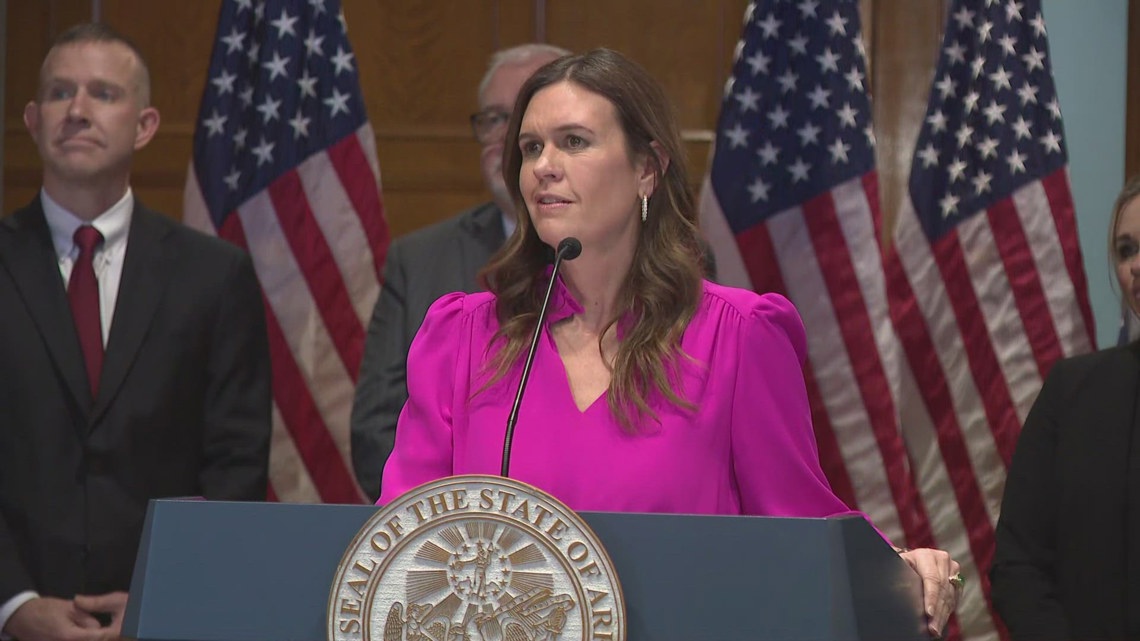Arkansas Governor Sarah Huckabee Sanders is taking aim at the use of taxpayer dollars for unhealthy food purchases by seeking federal approval to restrict the types of items that can be bought with Supplemental Nutrition Assistance Program (SNAP) benefits.
In a move that has sparked both support and opposition, Sanders submitted a waiver request to the U.S. Department of Agriculture (USDA) to ban soft drinks, candy, and other sugar-laden products from being eligible for SNAP purchases in Arkansas.
Sanders framed the proposal as a commonsense step toward promoting health and fiscal responsibility. “It’s time for Washington to get out of the way so Arkansas can set commonsense guidelines for what folks can buy with taxpayer-funded benefits,” Sanders stated in her official announcement.
The waiver, if approved, would make Arkansas the first state in the nation to prohibit SNAP users from purchasing junk food like soda and candy, a step many conservative leaders view as long overdue. According to the Governor’s office, more than $100 million in SNAP benefits are spent annually in Arkansas on soft drinks and unhealthy snacks.
Here is a a copy of the waiver and the Governor’s letter accompanying the waiver.
The administration argued that these purchases directly contradict the intended purpose of SNAP, which is to help low-income individuals and families afford nutritious food. “It’s about making sure that the help we’re giving people is actually helpful,” said Brooke Rollins, CEO of the America First Policy Institute and a supporter of the initiative, during the Governor’s announcement.
The Sanders administration’s move was immediately met with resistance from progressive groups and government-dependent advocates who claimed the restrictions would shame recipients and unfairly target low-income individuals. However, Sanders dismissed these arguments as political theater and insisted the policy is designed to restore dignity to the program and promote better health outcomes.
“This is about protecting our people, especially children, from the harms of sugar addiction and obesity,” Sanders said. “Allowing people to spend their food stamps on sodas and candy while childhood obesity rises isn’t compassion — it’s negligence.”
The USDA has historically resisted attempts by states to impose additional limitations on SNAP purchases, citing concerns about restricting food choices and creating administrative burdens. Several states, including New York and Minnesota, have submitted similar waiver requests in the past, only to be denied. But the Sanders administration is hopeful that a Republican-led USDA under a future Trump presidency might finally reverse course.
Arkansas joins Idaho and Indiana in pressing for greater state control over SNAP spending. All three states are asking for leeway to implement policies that prevent taxpayer money from funding poor dietary choices. The movement has picked up steam among conservative leaders who believe federal food aid should align with public health standards and personal responsibility.
Critics of the current system argue that federal bureaucrats are enabling unhealthy lifestyles by allowing SNAP dollars to be spent on junk food with no oversight. Many conservatives see this as just another example of Washington prioritizing political correctness over results.
Supporters of Sanders’ waiver include health advocates and fiscal conservatives who view the SNAP junk food ban as a step toward real accountability in welfare programs. By limiting SNAP funds to items with actual nutritional value, they believe the state can help reduce long-term healthcare costs associated with diet-related illnesses like diabetes and heart disease.
The Arkansas Department of Human Services, which oversees SNAP distribution in the state, would be responsible for enforcing the proposed restrictions if the waiver is approved. The agency has said it is fully prepared to implement the ban and has already begun identifying product categories that would be deemed ineligible under the new rules.
Governor Sanders has made clear that she will not back down from the challenge, even if the USDA rejects the initial request. “If Washington won’t act, we’ll keep fighting until they do,” she stated Governor.Arkansas.gov.
This effort comes as part of a broader push by Republican-led states to reclaim authority from federal agencies and return decision-making power to state governments. Conservatives argue that states are better positioned to craft policies that reflect the values and needs of their own populations, particularly when it comes to welfare and public health.
For many Americans who believe in personal responsibility and sound governance, Sanders’ proposal is a breath of fresh air. With millions of taxpayer dollars being funneled into the SNAP program every year, it raises a critical question: Should government assistance come with expectations for responsible use?
As the USDA reviews Arkansas’ waiver, the debate over SNAP restrictions is likely to intensify. But Governor Sanders has drawn a clear line: “Taxpayer dollars should not be fueling our obesity crisis.”
Whether or not Washington bureaucrats approve the waiver, the proposal has already reignited national conversations about welfare reform, healthy living, and the role of government in shaping the everyday choices of American citizens.





